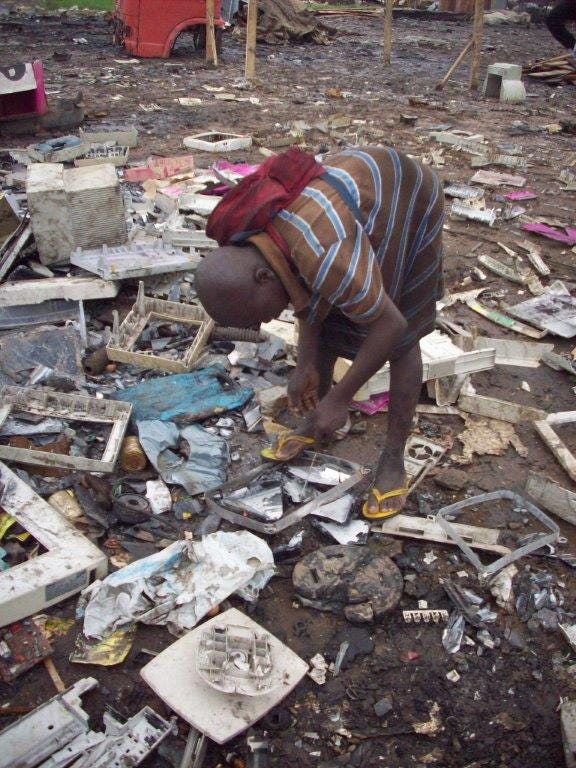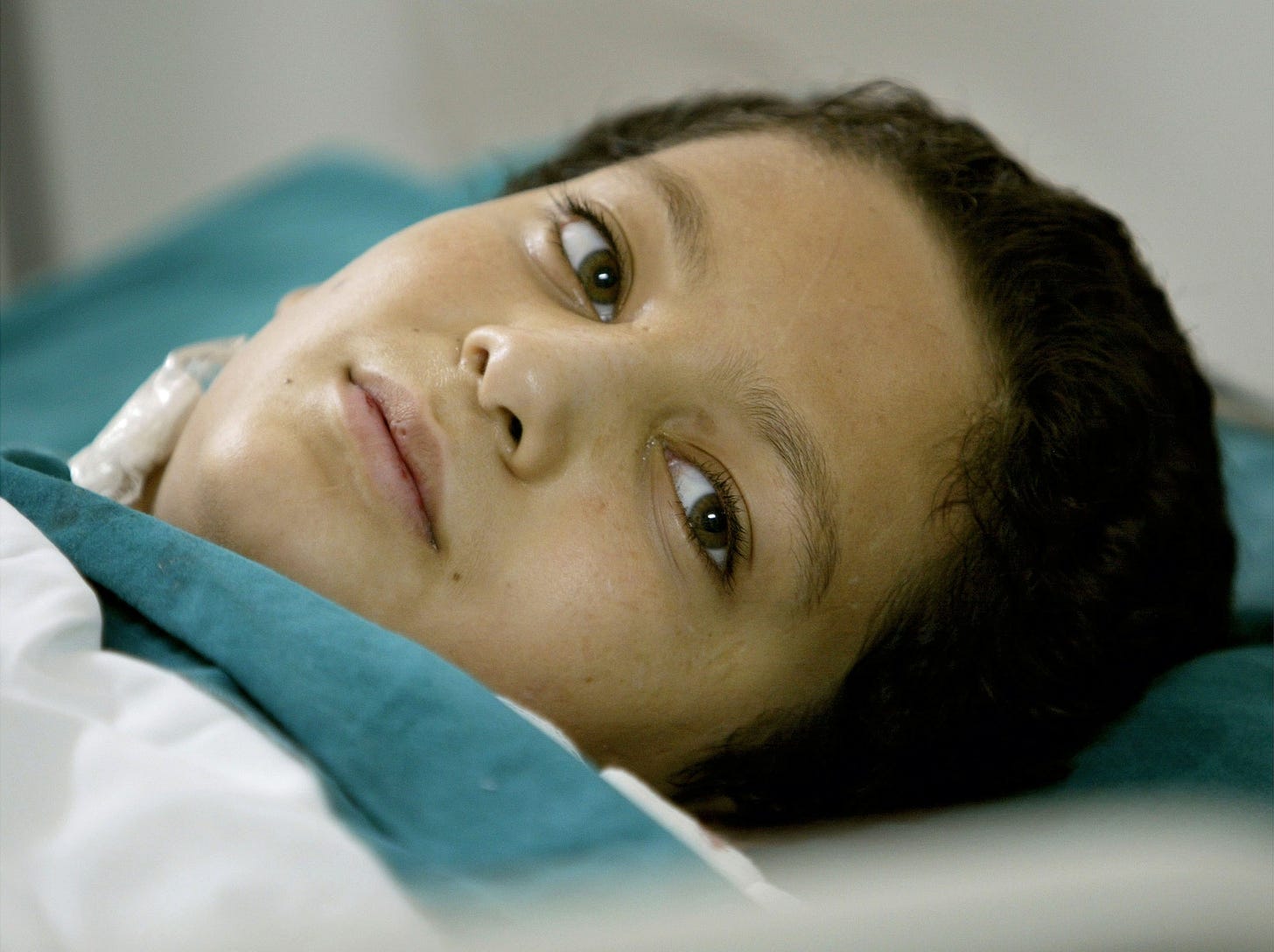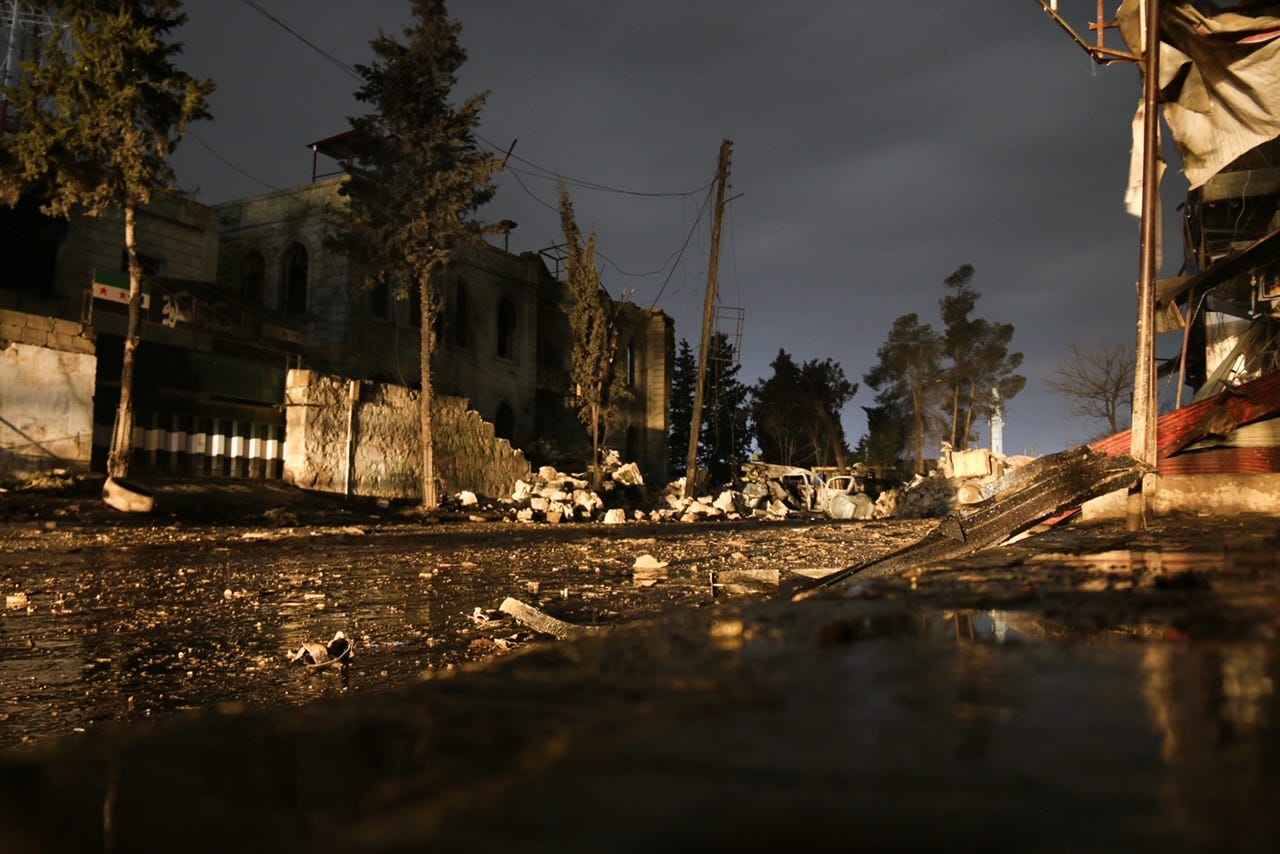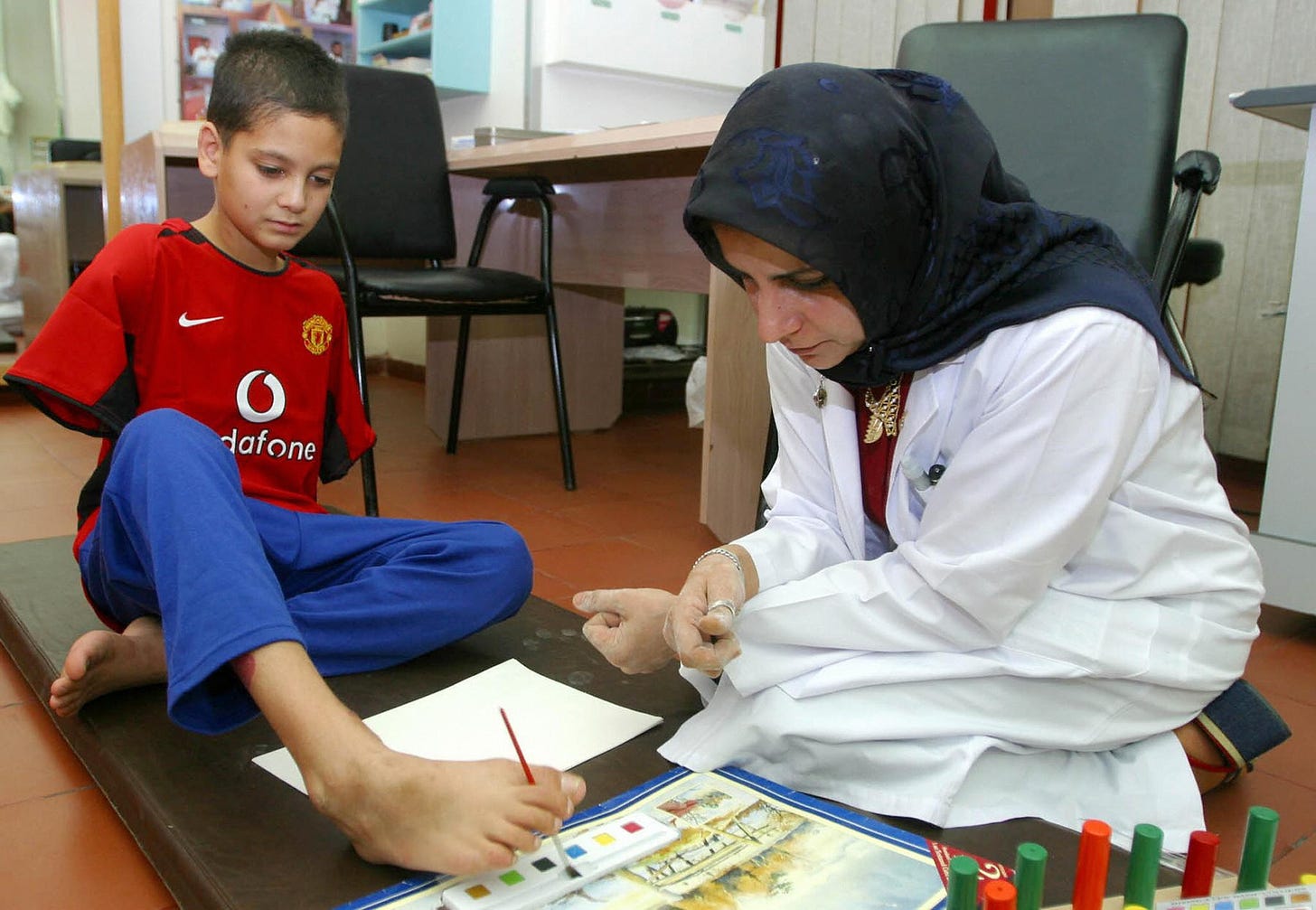Remembering The Iraqi Boy Who Survived the Horror of War
Ali Ismail Abbas was 12 when his family's home was hit by a U.S. missile during the 2003 war. Only he lived, badly injured.

Journalists are intruders.
Covering stories, they -- we, until I retired three years ago -- enter people’s lives, sometimes invited, sometimes welcomed, often neither, at times of emotional or physical trauma, anguish, loss, death. Occasions of extraordinary emotional vulnerability. We ask questions no stranger would ask. We probe. We push. We prod them to recount horrors with a camera pointed at them.
Journalists often imagine themselves inured to the violence, the chaos and the suffering they witness. We sometimes indulge in dark, irreverent humor in the face of awful circumstances. That hard boiled exterior is usually a shield. Reporters are vulnerable too. We are not unaffected by what we see and feel and experience.
The kids especially stick with you.
There was Mustapha, our ethnic Tajik teenaged translator in the Panjshir Valley of northern Afghanistan in 2001. He loved the expression "home sweet home" the first time he heard it, and would repeat it each time we returned from the front where the Northern Alliance, an anti-Taliban militia, was squared off against Taliban fighters. Where is he today in the new Taliban Afghanistan?

Accra, Ghana (2009)
There were the children as young as 6 in a muddy field outside Accra, Ghana in 2009, rummaging through discarded electronics, much of it exported from the U.S., to salvage slivers of copper wire to sell. They would set fire to the skeletal remains of computer monitors, emitting toxic smoke that they inhaled all day. A little boy told us his lungs hurt all the time. Where are they today?
There was the beautiful infant girl sleeping in the arms of her mother as she squatted in front of a small display of Chiclets and candy she was selling on a desolate street in Gaza City. What happened to them?
And there was Ali Ismail Abbas.

Ali at Kuwait hospital, 2003 (photo credit: Getty Images)
The first and last time I saw Ali was in 2003. He was 12 years old and laying naked on a medical examination table in a hospital in Kuwait City. His torso was blistered and shredded, streaked with blood. He had no arms, just two stumps. He was screaming in pain as doctors hunched over him.
A few days earlier, Ali had been home with his family in a Baghdad neighborhood when it was hit by a U.S. missile. His father, mother, brother and 11 other relatives were killed. A neighbor found Ali barely alive in the rubble and took him to a hospital.

Baghdad neighborhood hit by bombs -- not Ali's (photo credit: iStock)
Jon Anderson, a reporter for the New Yorker magazine, was in Baghdad visiting the hospital. He asked doctors if he could see some of the most severely injured patients. They took him to see Ali. They didn't expect him to live.
"His face was like an old Italian Renaissance painting," Anderson would write. "He had a biblical countenance. It was the face of innocence."
Ali did not die. When Anderson's story ran, he became a kind of celebrity. That celebrity brought him to the attention of the U.S. military, which quickly arranged for Ali to be airlifted to Kuwait where there were far better medical facilities than anything in Iraq.
I was in Kuwait after having spent a month during the war on an aircraft carrier in the Gulf (The U.S.S. Abraham Lincoln, which was to become famous when President Bush landed on the flat top off the coast of California and proclaimed, “Mission: accomplished.")
The war was over. ABC News, for whom I worked, was rapidly scaling down its operations. I was awaiting my marching orders to fly home when we learned that Ali Abbas, the famous Iraqi boy, was on his way to Kuwait.
Our team raced to the hospital to be there when he arrived. We joined a large media contingent standing outside the entrance to the emergency room. Without warning, an ambulance pulled up. The attendants got out and went to the rear to bring Ali out. But the crush of reporters and photographers were so close, they couldn't open the doors. They pleaded for us to back up. No one moved. For the photographers and TV camera people, stepping back meant risking not getting the dramatic video of the boy being removed from the ambulance. For what seemed like minutes, there was a standoff. The journalists wouldn't retreat. The attendants couldn't open the doors.
Finally, the scrum pulled back enough for the ambulance attendants to get Ali out on a stretcher. As he lay blinking and shrieking, he was bathed in the stroboscopic lights of dozens of camera flashes.
A reporter near me muttered, “That’s America. We blow you up and then patch you up.”
The screaming boy was wheeled away. My team followed, We assumed we'd be stopped but no one said anything, so we followed the gurney into the examination room. Still, no one objected, so the cameraman continued to shoot as Ali was transferred from the stretcher to the examination table. Then we left. That was the last time I saw Ali Abbas. A few days later, I flew home.

Ali rehabilitating in Kuwait (photo credit: Getty Images)
Ali's story slowly disappeared from the media. The last I heard, someone in Canada was trying to arrange for him to be sent there for treatment. Then, the story disappeared. I thought about Ali from time to time. I Googled his name and nothing came up.
In 2011, Time magazine published an article about him accompanied by a video of an interview with him.
Speaking in heavily accented English, he recalled the injuries he suffered.
"I couldn't think of anything else apart from the pain I had," he said. "I had so much pain, I just wanted to be relieved. But, you know, God wanted me to live.
Ali said, "I was always angry of what happened to us. I lost my family and what happened to me. Of course, I was angry. I don't see any reason why this happened. For me, it's like a nightmare.”
A year later, 2012, a friend In London sent me an article from the British newspaper, The Sun.
The headline read, ''I DIDN'T EXPECT TO LIVE ... BE LOVED AND MARRY'/ ICONIC FACE OF THE IRAQI WAR ALI ABBAS ON HIS EMOTIONAL WEDDING TO CHILDHOOD SWEETHEART"
There was a photo of Ali, now a young man, dressed on a suit, his tie a little askew, staring into the lens. His expression was blank. Next to him was a pretty young woman, also with no expression, holding a bouquet of flowers.
The photo caption read: Newlyweds Ali Abbas and his wife Ankam Hamza on their big day.
The story told how Ali, now living the U.K., returned each year to Iraq to visit relatives and met and had married Ankam there a few months earlier.
"I've definitely made the right choice," he was quoted saying. "She never lets me feel like I'm disabled. When I'm with her, I just feel normal, like me."
I looked at his photo for a long time.
I wrote an article about it for abcnews.com, ending it, "What was important, it seemed to me now as I read about his new life, his marriage, his joy, as I peered at the image of this young man and remembered the howling boy on the hospital table, as I listened to him speak, is that his nightmare is over."
My final words triggered a strong reaction on social media. A number of people were outraged that I would say his nightmare was over. The reactions shook me. Our natural reaction to criticism is to defend ourselves and question the motives of the criticizers. Which is how I reacted. But I kept thinking about it. In time, it came to me that they were right. Who was I to declare his nightmare over? It was ridiculous, even offensive.
Years passed. I thought about Ali but less often.
I wondered about Ali recently and did a Google search. There's quite a lot about a Pakistani actor and an Indian director with the same name. Not much about the Ali Abbas I was looking for. I did find a 2018 article in a British newspaper, The Mirror. It reported that his first marriage had ended in divorce. He had married a woman he met during one of his annual trips to Baghdad. She had given birth to their son, Yusuf. There was a photo of Ali feeding Yusuf from a bottle he deftly held with one foot. The article said he'd also had a sling fashioned so he could hold the baby close to his chest.
"After all that has happened in my life," Ali was quoting saying, "I almost have to pinch myself that he is here. He is the most wonderful, precious gift and I am determined to be the best father I can possibly be for him."
The Mirror said Ali had become a British citizen in 2010 and lives in London. It said his birthday was February 9, so he will turn 31 this year. I had a million questions and no answers. But that was okay.
That was the last mention of him that I could find. Twenty plus years ago, fate -- if there is such a thing -- had brought us together for a few moments. He never saw me. But I saw him. I still see him.
(cover photo credit: Getty Images)
You can sign up at secondacts.bulletin.com/subscribe to get free posts delivered to your inbox each week and read past articles. You can also follow me on Facebook, Instagram and Twitter.


